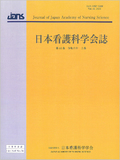Japanese
English
- 販売していません
- Abstract 文献概要
- 参考文献 Reference
要旨
目的:厳しい感染対策下における新型コロナウイルス感染症(COVID-19)患者と家族へEnd of life Care(EOLC)を行う看護師の思いと実践を明らかにする.
方法:COVID-19患者へのEOLCの経験がある看護師10名に半構造化面接を行い,質的帰納的に分析した.
結果:【尊厳あるケアができなかった不全感】【死別後,物のように扱われる患者への苦悩】【一律の感染対策に生じた怒りと葛藤】【厳しい感染対策におけるケアのシフトチェンジ】【諦めずに続けた面会の交渉】【臨終に立ち会えなかった家族への労り】等の12カテゴリが抽出された.
結論:本研究結果より,厳しい感染対策を強いられる危機的状況下においても,看護師の心理的安全性が担保された組織作りを行うこと,面会制限の中でも患者の生前から意図的にグリーフケアを計画して実践する重要性が示唆された.
Objective: This study aimed to elucidate the thoughts and practices of nurses providing end-of-life care(EOLC) to patients with coronavirus disease 2019(COVID-19) and their families.
Methods: Semi-structured interviews were conducted with 10 nurses experienced in providing EOLC to patients with COVID-19, and the collected data were analyzed qualitatively and inductively.
Results: Twelve categories emerged from the data analysis: "failure to provide dignified care," "struggle with treating patients as objects after bereavement," "anger and conflict over uniform infection control practices," "shift in care to focus on what can be done," "continued negotiation in meetings without giving up," and "care for family not allowed to be present at the deathbed."
Conclusion: The findings of this study suggest the importance of establishing an organizational environment that ensures nurses' psychological safety, especially in a crisis when strict infection control measures are enforced. Further, there is a need for intentionally planning and practicing grief care before a patient's death, even under visitation restrictions.
Copyright © 2024, Japan Academy of Nursing Science. All rights reserved.


